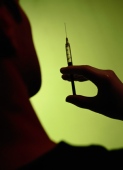
TUESDAY, April 3 (HealthDay News) — A vaccination may help boost the immune system of children with brain tumors, a small new study reports.
The prognosis for many children with brain tumors, known as gliomas, is grim. Radiation is the only effective treatment, although there has been hope that a vaccine could boost the immune system’s response.
The results of the new study, which included 27 children and was funded by the U.S. National Institutes of Health, were released Monday at the annual meeting of the American Association for Cancer Research (AACR) in Chicago.
“We’ve found that the vaccine is tolerated well with limited systemic toxicity, but we’ve also observed that there are some patients who have immunological responses to the vaccine target in the brain that can cause swelling and transient worsening, and subsequently, some of those children can have very favorable responses,” study lead author Dr. Ian Pollack said in an AACR news release.
“We’ve also demonstrated immunological responses in the majority of the kids,” added Pollack, who is vice chairman for academic affairs in the department of neurological surgery at the University of Pittsburgh School of Medicine.
The study patients included 16 children with newly diagnosed brain stem gliomas, five with newly diagnosed cerebral high-grade gliomas and six with recurrent gliomas.
“These kids, who, for the most part, have intact and very robust immune systems, seem to mount an immune response against the vaccine very effectively at rates that may be even higher than have been noted in studies in adults,” Pollack said in the news release.
“This was the first study of its type that examined peptide vaccine therapy for children with brain tumors like this,” added Pollack, who is also the chief of pediatric neurosurgery at Children’s Hospital of Pittsburgh and co-director of the University of Pittsburgh Cancer Institute Brain Tumor Program.
Some of the children experienced what is called “pseudoprogression” after receiving the vaccine, which means that the tumor temporarily grew and the disease symptoms worsened, but the tumor later got smaller and the disease stabilized, the study authors explained in the news release.
“The fact that we’ve seen tumor shrinkage in children with very high-risk tumors has been extremely encouraging and somewhat surprising,” Pollack noted.
Commenting on the study findings, Dr. John Yu, director of surgical neuro-oncology and vice chair of the department of neurosurgery at the Cedars-Sinai Medical Center in Los Angeles, said that the impact on the immune systems of the patients is impressive.
“The safe and potentially effective nature of this vaccine would give thousands of patients new hope,” Yu said. “Although one cannot glean whether this will improve their overall survival while maintaining a good quality of life, it provides some hope that harnessing the power of the immune system to fight off the brainstem glioma may kill tumor cells and provide a novel means of fighting off their disease.”
Because this study was presented at a medical meeting, the data and conclusions should be viewed as preliminary until published in a peer-reviewed journal.
More information
For more about pediatric brain cancer, visit the U.S. National Library of Medicine.

